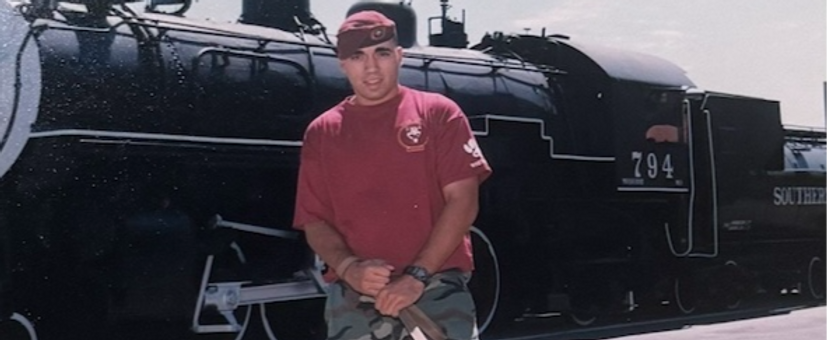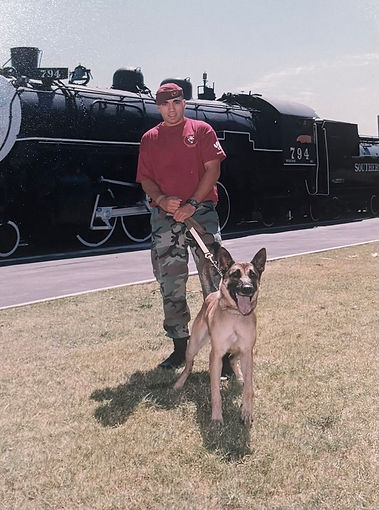Transitioning with Purpose: Ray Whitaker’s Story of Military Service and Beyond

Transitioning from a 22-year career in the Army, especially after serving in special operations and reaching the esteemed rank of Sergeant Major, is no small feat. Ray Whitaker’s journey from the highest levels of military service to civilian life is a compelling testament to the challenges and opportunities faced by veterans and their families. In this blog, Ray shares his personal experiences and insights on navigating the complexities of transitioning, offering valuable advice for veterans who find themselves at a similar crossroads.
Ray Whitaker’s journey began with a bold step into a recruiter’s office in the 90’s, a decision that would launch a distinguished and decades-long career in the United States Army. Ray began his military service as an infantryman, immediately heading to Airborne school after basic training. His first assignment was in South Korea at the Demilitarized Zone (DMZ), where he quickly learned the realities of military life.
“I loved the infantry,” he said. “It was the best time of my life, even in basic training. You meet these people who truly become a big part of your life because the camaraderie stuck. It’s one of those jobs where people say, ‘Oh you’re going to get smoked,’ and we think, ‘Bring it.’”
After his time in Korea, Ray was stationed at Fort Bragg as part of the 2nd Battalion, 505th Parachute Infantry Regiment. After multiple years of service in the organization, Ray began to consider leaving the military, with a goal of becoming a law enforcement officer.
“Even as a kid, I knew I wanted to go into law enforcement of some sort,” Ray explained. “I was at my first enlistment window and thinking about what I wanted to do next, so I went to the DEA and started the application process. “The recruiter basically told me, ‘You don’t have the education or requirements to get out and come into law enforcement right now. You need more education or experience inside of law enforcement.’ His platoon sergeant at the time recommended he consider becoming a military policeman, so, he left the 2/505 and joined the 82nd Military Police (MP) company.”
Though this company was later disbanded, Ray credits his experience in the 82nd MP Company as the reason he continued his service in the military. As with most things, it all goes back to the people, and the ones he was fortunate to serve alongside left an indelible mark on his journey.

Ray then transitioned to a role as a canine handler and was later selected for a role at Fort Leonardwood as the first MP corps dog proponency officer in the Army. He then had the opportunity to move into special operations, finishing the remainder of his career (another 14-15 years) out of Fort Liberty, North Carolina.
In early 2015, after 22 years of dedicated service, Ray decided to retire from the Army. Two days later, he went to work, turned in his retirement packet, and within months, he was transitioning out of the military.
“The hard part of the transition was being at the top and then stepping out and going into nothing,” he shared.
“One time, I was at a training event and went to the local VFW where I sat between these two Vietnam veterans. The one asked how long I had been in, and I told him, saying, ‘I can’t wait to retire, it’ll be in this many years.’ And this Vietnam vet says, ‘It’ll be the hardest thing you ever do. The hardest part of leaving service is that one day you matter and the next day you don’t.’ I didn’t understand that then, but when I retired, I got it.
“The last time I drove off the installation, I remember thinking, ‘That’s it?’ No one called. I wasn’t getting text messages. There was nothing. There was a calm. But it was also dead silent. That was the hardest part of all of it. For most service members, I would argue that that’s the worst part. You don’t have anyone to ask questions to. And how are you supposed to talk to your spouse or family about it? It’s different for them. They served but in a different way.
“Suddenly, I was on everybody else’s time instead of my own. Now, I don’t control my employment. I don’t control how fast things move. I don’t control how people speak to me. I don’t understand the aspects of my own household which I haven’t really been part of for many years. I was learning to live as somebody who was part of the family again. At that point, my wife and I had been married for 15 years and I was probably gone for 10 of them. It was a huge challenge. I didn’t feel like I controlled anything, and didn’t feel like I was prepared for that switch.
“To add to that, I was leaving at the height of my career and so all I could think was, ‘If I’m having problems, what’s it like for everyone else? What about my brothers and sisters?’”
Ray’s experience underscores the universal challenges of transitioning from military to civilian life, even for those with extensive experience and resources. His journey serves as a powerful reminder that the transition is a deeply personal and often difficult process, requiring resilience and adaptability.
After his retirement, Ray tried his hand at various business ventures, some successful and others less so. His first business struggled, teaching him valuable lessons about the importance of mentorship and the need for a support network.
“Business A? Yep, scorched. Business B? Found a mentor, found people to talk to, learned from my first experience, and that business is still successful today,” Ray reflects.
His involvement with organizations like Team Rubicon, where he participated in disaster response efforts, was a turning point, too. “There’s nothing like picking up a sledgehammer and going into a home and tearing it apart after a family has lost everything and can’t pay for the demolition themselves,” Ray recalls of his work during Hurricane Matthew relief efforts. This hands-on, purposeful work provided a sense of fulfillment and camaraderie that he had missed since leaving the military.
Ray also joined the American Legion and Operation Supply Drop, finding a new mission in helping veterans. These experiences led him to work with the USO’s Pathfinder program, assisting veterans in their transition to civilian life. However, Ray realized he needed to focus on his transition before he could fully help others. He took time to establish himself in the corporate world, building a security department and eventually returning to the nonprofit sector, where he found his passion in supporting veterans and their families.
Ray now serves in an executive leadership position with Mission Roll Call as its Chief Operating Officer, bringing a wealth of knowledge and dedication to his role.
Advice for Fellow Veterans
Ray’s journey from military service to civilian life taught him valuable lessons he now shares with others:
- Seek Community: Finding a tribe can provide crucial support and a sense of belonging. Everybody needs a mentor. Sometimes, that mentor might be somebody in a career you want to go into or outside of it, but it’s important to engage with people who understand your experiences and can offer guidance. “Having people to talk to, lean on, and laugh with is huge. And that goes for military spouses and children, too. Find your tribe.”
- Pursue Your Passion: Take the time to explore what excites and fulfills you. Ray emphasizes the importance of aligning your work with your passions, as this can lead to greater satisfaction and success. “Only you can define what your success looks like.”
- Stay Resilient: Ray’s journey was not without its challenges, but his resilience and adaptability were key to overcoming obstacles. “Keep moving forward. Be part of the solution not part of the problem,” he said.
“Most of us went to college during service, led lives while we were deployed, and generally managed a lot,” Ray explained. “We’re highly capable people. Don’t let other people tell you you can’t do it. Know what you’re good at and what you’re not good at. Put passion first and take the time to find that passion and then pursue it.”
Ray’s post-military careers have been diverse, from working in the nonprofit sector with the USO to starting his own businesses. But his commitment to impacting the lives of more veterans and their families has never wavered.
For Ray, the hardest part was not the physical challenges of service but the mental shift required to adjust to a new normal. His journey is a powerful reminder that the transition from military to civilian life, though challenging, is also an opportunity for growth and new beginnings.
As Ray puts it, “No one is going to stop me other than me.” His determination and willingness to adapt have been key to his success, and he continues to inspire others to find their own path after military service. Ray’s story proves that even after leaving the military, the mission never truly ends—it simply evolves.
Whether you’re navigating this path now or have done so in the past, your experiences and insights are invaluable. We invite you to share your own transition stories with us, as they help others feel understood and directly inform our advocacy efforts. By becoming a member of Mission Roll Call, you join a community dedicated to championing better resources and support for all veterans. Join us today and lend your voice to this important cause.